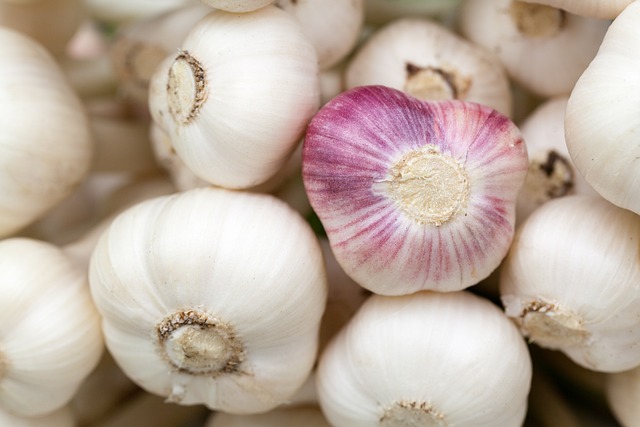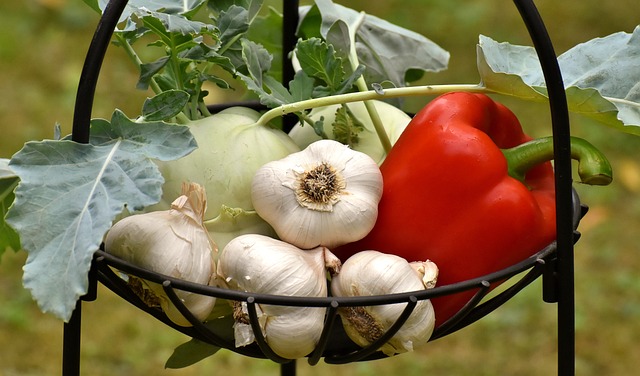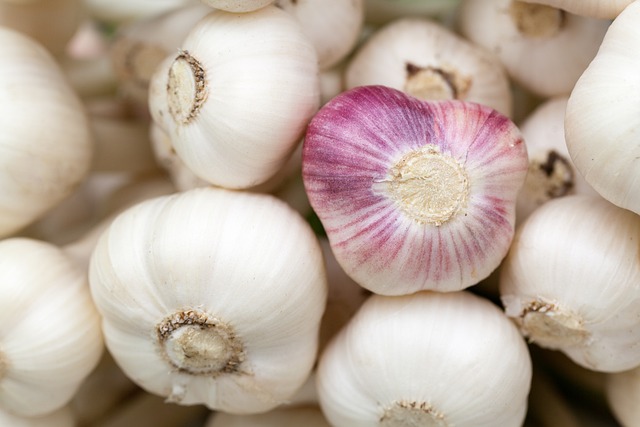I- Introduction: Embracing the Healthful Magic of Garlic (Ail)
In the realm of culinary delights and natural remedies, few ingredients hold as much allure and mystique as garlic, also known as "ail" in some cultures. Picture the sizzle of minced cloves in a hot pan, releasing their fragrant aroma, or the comforting warmth of garlic-infused soup on a chilly evening. Beyond its undeniable culinary charm, garlic has a storied history steeped in tradition and healing wisdom, making it a true treasure in our kitchens and medicine cabinets alike.

From ancient civilizations to modern-day wellness enthusiasts, garlic's reputation as a potent medicinal herb precedes itself. This unassuming bulb, with its papery skin and pungent aroma, has been celebrated for centuries for its remarkable health benefits. Whether in traditional remedies passed down through generations or in the latest scientific studies, garlic stands tall as a testament to nature's ability to nurture and heal.
A Brief Journey Through Time
Step back with me into the annals of history, where garlic finds its place among the treasures of ancient civilizations. From the ancient Egyptians who revered garlic for its health-promoting properties to the Greeks and Romans who saw it as a symbol of strength and vitality, garlic's presence in human culture is as enduring as it is diverse.
In the world of traditional medicine, garlic holds a revered position. Ayurveda, the ancient healing system of India, extols garlic for its ability to balance doshas and promote overall well-being. Similarly, Traditional Chinese Medicine (TCM) recognizes garlic as a potent remedy for a variety of ailments, from respiratory issues to digestive woes.
The Alchemy of Nutrition
Delve a little deeper, and you'll find that garlic's potency extends beyond its unmistakable aroma and flavor. This humble bulb is a nutritional powerhouse, boasting an impressive array of vitamins, minerals, and bioactive compounds. Vitamin C, vitamin B6, manganese, selenium—these are just a few of the essential nutrients packed into each clove of garlic, offering a myriad of healthful benefits.
Unveiling the Magic
Join me on a journey through the wonders of garlic (ail) as we uncover its immune-boosting properties, heart-healthy effects, and potential in cancer prevention. From its role in reducing inflammation to its antioxidant prowess, garlic's benefits are as diverse as they are profound.
In the Kitchen and Beyond
But let's not forget the joy of garlic in our daily lives. From tantalizing recipes that showcase garlic's versatility to practical tips on using this culinary gem, we'll explore how garlic can elevate our meals and our well-being.
A Call to Embrace Garlic's Gifts
So, dear reader, I invite you to embark on this exploration of garlic's healthful magic with an open mind and a hungry heart. Whether you're a seasoned chef or a curious home cook, there's something enchanting about the power of garlic to nourish, heal, and delight. Join me as we peel back the layers of this beloved bulb and discover the myriad ways in which garlic (ail) can enhance our lives, one clove at a time.
II. The Nutritional Profile of Garlic

Garlic, often regarded as nature's potent wonder, not only enhances the flavor of dishes but also packs a powerful nutritional punch. Let's delve into the nutritional composition of this humble bulb and uncover the wealth of vitamins, minerals, and beneficial compounds it offers.
1. Vitamins
Garlic is a rich source of several essential vitamins, each contributing to its healthful properties:
-
Vitamin C: Known for its immune-boosting capabilities, garlic contains a notable amount of vitamin C, offering antioxidant protection and aiding in collagen production.
-
Vitamin B6: Crucial for metabolism and brain function, garlic provides a good dose of vitamin B6, supporting nerve health and cognitive function.
2. Minerals
In addition to vitamins, garlic is a treasure trove of essential minerals that our bodies rely on for various functions:
-
Manganese: Garlic contains manganese, a trace mineral vital for bone health, metabolism, and antioxidant defense.
-
Selenium: This mineral plays a crucial role in thyroid function and supports the immune system. Garlic offers a modest yet beneficial amount of selenium.
3. Allicin and Other Compounds
One of the most celebrated compounds in garlic is allicin, formed when garlic is chopped, crushed, or chewed. Allicin is responsible for garlic's distinct aroma and many of its health benefits:
-
Allicin: With potent antimicrobial and antioxidant properties, allicin is considered the star player in garlic's health benefits. It helps combat infections, supports heart health, and contributes to garlic's immune-boosting prowess.
-
Sulfur Compounds: Garlic contains sulfur compounds, including diallyl sulfide and diallyl disulfide, which contribute to its distinctive taste and smell. These compounds have been linked to potential anti-cancer properties and may help reduce inflammation.
4. Low-Calorie, High-Nutrient Density
One of the most appealing aspects of garlic is its low-calorie content paired with its high nutrient density. For those conscious of their calorie intake but eager to maximize nutritional benefits, garlic is a valuable addition to any diet. A single clove of garlic contains minimal calories but provides a wealth of essential nutrients, making it an ideal choice for those seeking a flavorful and healthful boost to their meals.
Embracing Garlic's Nutritional Bounty
Incorporating garlic into your diet not only adds depth and flavor to dishes but also introduces a host of vitamins, minerals, and beneficial compounds. Whether minced into sauces, roasted to perfection, or infused into oils, garlic's nutritional profile makes it an excellent choice for those looking to enhance their overall health and well-being. So, let's celebrate the multifaceted benefits of garlic—nature's nutritional powerhouse—and savor its culinary and healthful magic with each delectable bite.
III. Garlic as an Immune Booster

Garlic, with its potent arsenal of compounds, particularly allicin, has long been revered for its immune-boosting properties. Let's delve into the science behind how garlic's natural components work to strengthen the body's defenses against infections and illnesses.
1. Allicin: Nature's Antimicrobial Agent
At the heart of garlic's immune-boosting prowess lies allicin, a sulfur-containing compound formed when garlic is crushed or chopped. Allicin is not only responsible for garlic's distinct aroma but also its powerful antimicrobial and antiviral properties:
-
Antimicrobial Properties: Allicin exhibits potent antimicrobial activity against a wide range of bacteria, fungi, and even some parasites. Studies have shown that allicin can inhibit the growth of harmful pathogens, including Staphylococcus aureus and Escherichia coli.
-
Antiviral Activity: Garlic's allicin has also demonstrated antiviral effects, particularly against common viral infections like the flu and the common cold. By interfering with viral replication processes, allicin may help reduce the severity and duration of viral illnesses.
2. Boosting the Immune System
Garlic's immune-boosting effects go beyond its antimicrobial properties. Studies have shown that regular consumption of garlic can have a positive impact on the immune system, enhancing its ability to fend off infections:
-
Enhanced White Blood Cell Activity: Garlic has been found to stimulate the activity of white blood cells, the body's frontline defenders against infections. These cells play a crucial role in identifying and eliminating pathogens, and garlic may help bolster their effectiveness.
-
Antioxidant Support: The antioxidants in garlic, including allicin and other sulfur compounds, help neutralize harmful free radicals in the body. By reducing oxidative stress, garlic supports overall immune function and protects against cellular damage.
3. Studies Supporting Garlic's Immune Benefits
Numerous scientific studies have explored the immune-boosting effects of garlic, with compelling results:
-
A Study in Journal of Nutrition: A study published in the Journal of Nutrition found that participants who consumed garlic supplements experienced fewer colds and recovered faster compared to those who did not.
-
Clinical Trials: Clinical trials have shown that garlic supplements can enhance immune cell activity, leading to improved immune response. This may translate to better protection against infections and a reduced risk of falling ill.
4. Incorporating Garlic for Immune Health
Adding garlic to your daily diet is a simple yet effective way to reap its immune-boosting benefits. Whether raw, cooked, or in supplement form, garlic's allicin content remains a potent ally in supporting your body's defenses.
Embracing Garlic's Immune-Boosting Power
In conclusion, garlic's reputation as an immune booster is well-founded in scientific research and centuries of traditional use. With its allicin-rich profile and immune-enhancing properties, garlic stands as a formidable ally in the fight against infections and illnesses. Whether used as a flavorful addition to meals or consumed in supplement form, garlic offers a natural and effective way to support your immune system and promote overall well-being. So, let's embrace the immune-boosting magic of garlic and savor its healthful benefits with each delicious bite.
IV. Cardiovascular Health Benefits of Garlic

Garlic has long been recognized for its potential to promote heart health and reduce the risk of cardiovascular diseases. Let's explore how this humble bulb may contribute to cardiovascular well-being by lowering cholesterol levels, reducing blood pressure, and supporting overall heart health.
1. Lowering Cholesterol Levels
One of garlic's most studied benefits for cardiovascular health is its ability to lower cholesterol levels, particularly LDL cholesterol, often referred to as "bad" cholesterol:
-
Allicin's Role: Allicin, the sulfur compound in garlic, is believed to play a significant role in cholesterol reduction. Studies suggest that allicin may inhibit the enzyme HMG-CoA reductase, which is involved in cholesterol synthesis in the liver.
-
Reducing LDL Cholesterol: By inhibiting cholesterol synthesis, garlic may help lower LDL cholesterol levels in the blood. High levels of LDL cholesterol are a risk factor for atherosclerosis, a condition characterized by the buildup of plaque in the arteries.
2. Blood Pressure Regulation
Garlic has also been studied for its potential to help regulate blood pressure, which is another critical aspect of heart health:
-
Vasodilation Effects: Garlic's sulfur compounds, including allicin, have been found to promote vasodilation, the widening of blood vessels. This action may help lower blood pressure by reducing resistance to blood flow.
-
Stress Reduction: Additionally, garlic may help reduce stress-induced hypertension. Stress hormones can elevate blood pressure, and garlic's calming effects may mitigate this response, leading to more stable blood pressure levels.
3. Research on Cardiovascular Diseases
Numerous scientific studies have investigated garlic's impact on cardiovascular diseases, including heart attacks and strokes, with promising results:
-
Meta-Analysis in Atherosclerosis: A meta-analysis published in the journal Atherosclerosis reviewed several studies and found that garlic supplementation was associated with a significant reduction in total cholesterol levels.
-
Clinical Trials on Blood Pressure: Clinical trials have also demonstrated garlic's potential to lower blood pressure. A study published in the Journal of Hypertension showed that garlic supplements led to a modest but significant reduction in both systolic and diastolic blood pressure.
4. Reducing Cardiovascular Risk
By lowering cholesterol levels, regulating blood pressure, and potentially improving other cardiovascular risk factors, garlic may help reduce the overall risk of cardiovascular diseases:
-
Atherosclerosis Prevention: The ability of garlic to lower LDL cholesterol and inhibit plaque formation in the arteries may reduce the risk of atherosclerosis, a leading cause of heart attacks and strokes.
-
Antioxidant Protection: Garlic's antioxidants, including allicin, help protect blood vessels from oxidative damage. This protection may further contribute to a healthier cardiovascular system.
5. Incorporating Garlic for Heart Health
To harness garlic's cardiovascular benefits, incorporating it into your daily diet is key. Whether raw, cooked, or in supplement form, garlic's active compounds can offer significant heart-protective effects.
Embracing Garlic for a Healthy Heart
In conclusion, garlic's potential to promote cardiovascular health is supported by scientific research and centuries of traditional use. From lowering cholesterol and blood pressure to reducing the risk of atherosclerosis and cardiovascular diseases, garlic's heart-protective benefits are well-documented. By embracing garlic as a flavorful addition to meals or as a supplement, individuals can support their heart health and take proactive steps toward a healthier cardiovascular system. Let's celebrate the heart-loving magic of garlic and enjoy its healthful benefits with every savory bite.
V. Anti-Inflammatory and Antioxidant Properties of Garlic

Garlic, revered for its culinary prowess, also boasts impressive anti-inflammatory and antioxidant properties that contribute to its health-promoting effects. Let's delve into how garlic's antioxidants work to reduce inflammation, combat oxidative stress, and protect our cells, thereby enhancing overall health and well-being.
1. Antioxidant Powerhouse
At the core of garlic's health benefits lies its rich array of antioxidants, which play a crucial role in neutralizing harmful free radicals in the body:
-
Allicin and Sulfur Compounds: Garlic's signature compound, allicin, along with other sulfur compounds, serves as potent antioxidants. These compounds scavenge free radicals, preventing them from causing cellular damage and inflammation.
-
Vitamin C: Garlic contains vitamin C, another powerful antioxidant that supports the immune system and protects cells from oxidative stress.
2. Reducing Inflammation
Chronic inflammation is a common underlying factor in many chronic diseases, from arthritis to heart disease. Garlic's anti-inflammatory properties can help mitigate this inflammatory response:
-
Allicin's Anti-Inflammatory Effects: Studies suggest that allicin and other sulfur compounds in garlic have anti-inflammatory effects, inhibiting the production of inflammatory molecules in the body.
-
Arthritis Relief: Research has shown that garlic may alleviate symptoms of inflammatory conditions like arthritis. By reducing inflammation in the joints, garlic can help improve mobility and reduce pain.
3. Combatting Oxidative Stress
Oxidative stress occurs when there's an imbalance between free radicals and antioxidants in the body. Garlic's antioxidants help restore this balance and protect our cells from damage:
-
Protecting Cells: Garlic's antioxidants, particularly allicin, help protect cells from oxidative damage. This protection extends to various tissues and organs, including the heart, brain, and skin.
-
Skin Health: Garlic's antioxidant properties may also benefit the skin by reducing oxidative stress and promoting a youthful appearance. Some skincare products even incorporate garlic extracts for their anti-aging effects.
4. Research on Garlic's Anti-Inflammatory and Antioxidant Effects
Scientific studies have shed light on garlic's ability to combat inflammation and oxidative stress, with promising findings:
-
Journal of Medicinal Food Study: A study published in the Journal of Medicinal Food found that garlic extract reduced markers of inflammation in participants with osteoarthritis, improving their symptoms.
-
Oxidative Medicine and Cellular Longevity: Another study in Oxidative Medicine and Cellular Longevity highlighted garlic's role in reducing oxidative stress and protecting cells from damage. The study suggested that garlic's antioxidants could have wide-ranging benefits for overall health.
5. Incorporating Garlic for Health and Well-Being
To reap the anti-inflammatory and antioxidant benefits of garlic, incorporating it into your diet is key:
-
Raw Garlic: Consuming raw garlic is a potent way to benefit from its antioxidants. Crushing or chopping garlic and letting it sit for a few minutes before consuming can enhance the formation of allicin.
-
Cooked Garlic: Even when cooked, garlic retains many of its healthful properties. Incorporate garlic into soups, stews, stir-fries, and sauces for both flavor and health benefits.
Embracing Garlic's Protective Properties
In conclusion, garlic's anti-inflammatory and antioxidant properties make it a valuable ally in promoting overall health and well-being. From reducing inflammation and oxidative stress to protecting our cells from damage, garlic's antioxidants offer a wide range of health benefits. Whether enjoyed raw or cooked, garlic's medicinal properties can be harnessed in delicious and creative ways. Let's embrace the anti-inflammatory and antioxidant magic of garlic and savor its healthful effects with every delectable dish.
VI. Cancer Prevention Potential
Garlic's potential in reducing the risk of certain cancers, such as stomach and colorectal cancer, has garnered significant attention in the realm of health research. Let's explore the studies suggesting garlic's role in cancer prevention and how its compounds may inhibit cancer cell growth while promoting apoptosis, or cell death, in cancerous cells.
1. Studies on Cancer Prevention
Scientific investigations have revealed promising findings regarding garlic's cancer-fighting properties:
-
Stomach Cancer: A study published in the journal Cancer Prevention Research found that regular consumption of garlic was associated with a lower risk of developing stomach cancer. Garlic's organosulfur compounds were highlighted for their potential protective effects.
-
Colorectal Cancer: Another study in the British Journal of Cancer suggested that garlic intake may be linked to a reduced risk of colorectal cancer. Allicin and other sulfur compounds in garlic were found to inhibit the growth of colorectal cancer cells in laboratory studies.
2. Inhibiting Cancer Cell Growth
Garlic's bioactive compounds, particularly allicin, have been studied for their ability to inhibit the growth of cancer cells:
-
Allicin's Anticancer Effects: Allicin has been shown to disrupt the cell cycle of cancer cells, preventing their proliferation. Additionally, it may induce apoptosis, or programmed cell death, in cancerous cells while sparing healthy cells.
-
Sulfur Compounds: Other sulfur-containing compounds in garlic, such as diallyl sulfide and diallyl disulfide, have also demonstrated anticancer properties. These compounds may interfere with cancer cell signaling pathways, leading to their inhibition.
VII. Garlic in Traditional Medicine
Throughout history, garlic has held a revered place in traditional medicine systems such as Ayurveda and Traditional Chinese Medicine (TCM). Let's explore how garlic has been used to treat various ailments, from colds and flu to digestive issues:
1. Ayurvedic Use of Garlic
In Ayurveda, garlic, or "Lasuna," is considered a valuable herb with diverse medicinal properties:
-
Immune Support: Garlic has been traditionally used to strengthen the immune system and ward off infections. It is often recommended during seasonal changes to prevent colds and flu.
-
Digestive Aid: Garlic is known to stimulate digestion and improve gastrointestinal health. It is used to alleviate indigestion, bloating, and gas.
2. Garlic in Traditional Chinese Medicine (TCM)
In TCM, garlic, or "Da Suan," is valued for its warming properties and ability to promote circulation:
-
Respiratory Health: Garlic is used to clear phlegm and relieve coughs and congestion. It is often included in remedies for respiratory infections.
-
Detoxification: Garlic is believed to support detoxification processes in the body, aiding in the elimination of toxins.
VIII. Culinary Uses and Tips
Incorporating garlic into daily meals not only adds flavor but also enhances nutritional value. Here are some tips for maximizing the benefits of garlic in your culinary creations:
1. Roasted Garlic Cloves
- Roasting garlic cloves brings out their natural sweetness and mellow flavor. Simply drizzle whole cloves with olive oil, wrap in foil, and roast until tender. Enjoy as a spread or mix into mashed potatoes.
2. Garlic-Infused Oils
- Make your own garlic-infused oil by heating olive oil with crushed garlic cloves over low heat. Use this fragrant oil for sautéing vegetables, drizzling over pasta, or as a dipping oil for bread.
3. Garlic-Rich Dressings
- Create vibrant salad dressings by blending garlic with olive oil, lemon juice, mustard, and herbs. Garlic adds depth of flavor and a nutritional boost to salads.
IX. Precautions and Side Effects
While garlic offers numerous health benefits, it's essential to be aware of potential side effects and precautions:
-
Digestive Issues: Some individuals may experience digestive discomfort such as heartburn, gas, or bloating with raw garlic consumption. Cooking garlic can reduce these effects.
-
Allergic Reactions: Rarely, individuals may have an allergic reaction to garlic, leading to symptoms such as skin rash, itching, or difficulty breathing. If allergic, avoid garlic and seek medical advice.
-
Interactions with Medications: Garlic supplements may interact with certain medications, such as blood thinners and HIV medications. Consult with a healthcare provider before starting garlic supplements.
X. Conclusion: Embracing the Wonders of Garlic (Ail)
In conclusion, garlic (ail) stands as a true culinary and medicinal marvel, offering a wealth of health benefits backed by both tradition and modern science. From its immune-boosting and heart-protective properties to its potential in cancer prevention and treatment of various ailments, garlic's versatility knows no bounds.
As we savor the myriad flavors and aromas of garlic in our dishes, let us also celebrate its profound impact on our health and well-being. Whether enjoyed raw, cooked, or as a supplement, garlic invites us to embrace its nourishing gifts and explore its culinary magic.
So, let's raise a toast to garlic (ail)—nature's potent bulb of health and flavor—and invite it into our lives with open arms. May each clove of garlic remind us of the remarkable power of nature to heal, nourish, and delight. Here's to a life enriched by the wonders of garlic, one delicious recipe at a time. Cheers to health, vitality, and the flavorful journey

You must be logged in to post a comment.